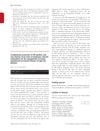Search
for
Sort by
Research
720-750 / 1000+ results
research Cosmetic Devices Based on Active Transdermal Technologies
Active transdermal technologies in cosmetics help deliver skin treatments effectively, but their safety and effectiveness depend on skin type and treatment choice.

research Medical and Procedural Treatment of Androgenetic Alopecia – Where Are We?
New treatments for hair loss include low-dose pills, updated drugs, supplements, light therapy, plasma injections, and advanced hair transplant techniques.

research An Update in the Management of Alopecia Areata
New treatments for alopecia areata show promise, but more research is needed to confirm their effectiveness.

research Photobiomodulation Therapy in Plastic Surgery and Dermatology
Photobiomodulation therapy is beneficial in plastic surgery and dermatology.

research Treatment of Alopecia Areata and Its Numerous Possibilities: A Literature Review
Alopecia areata treatment should be personalized, using topical or systemic therapies based on severity, with promising options like JAK inhibitors needing more research.

research Robotic Hair Restoration
Robotic hair restoration is a safe, efficient alternative to manual hair transplant, best for men with dark, thick hair and skin, requiring sufficient donor hair and postoperative care.
research The Effectiveness of Adding Low-Level Light Therapy to Minoxidil 5% Solution in the Treatment of Patients with Androgenetic Alopecia
Adding low-level light therapy to minoxidil improves hair growth and patient satisfaction.

research Autologous Platelet Concentrates in Aesthetic Medicine
Autologous platelet concentrates show promise in esthetic treatments but need more standardized research.

research Platelet-Rich Fibrin Matrix for Androgenetic Alopecia
PRFM may help treat hair loss, especially in mild cases.

research The Management of Postacne Scarring
New treatments for acne scars are safer and more effective because we understand the causes better.

research Clinical Application of Platelet-Rich Fibrin in Dermatology
Platelet-Rich Fibrin (PRF) can speed up healing in chronic wounds, improve hair density, and act as a natural filler for skin rejuvenation, but its use in hair loss treatment needs more evaluation.

research Low-Level Light Therapy and Hair Loss
Low-level light therapy may reduce hair loss and improve hair quality but it's unclear who benefits most.

research Lasers in the Management of Alopecia: A Review of Established Therapies and Advances in Treatment
Lasers and light therapies are effective in promoting hair regrowth for different types of hair loss.
research Symposium 6-4: Recent Progress in the Treatment of Male Pattern Hair Loss: Lasers and Devices
Laser and light treatments show promise for hair growth but need more research.
research Hair Loss and Hirsutism Management
Low-level light therapy, possibly combined with other treatments, may become a leading hair loss treatment, while hirsutism often worsens with age and lacks preventive options.

research Managing the PCOS-Related Symptoms of Hirsutism, Acne, and Hair Loss
Birth control pills and anti-androgen medications help manage hair growth, acne, and hair loss in women with PCOS.

research Management of Primary Cicatricial Alopecias: Options for Treatment
There are many treatments for permanent hair loss disorders, but their effectiveness varies and there's no clear best option.

research Low Fluence-High Repetition Rate Diode Laser Hair Removal 12-Month Evaluation: Reducing Pain and Risks While Keeping Clinical Efficacy
A low-power, fast laser safely reduces hair with minimal pain and few side effects.

research Low-Level Pulsed Wave Red Light Induces Type I Procollagen Protein and ATP Production at Shorter Treatment Times Compared to Continuous Wave Red Light
Pulsed red light boosts collagen and energy in cells faster than continuous red light.
research Role of Low-Level Light Therapy in Androgenetic Alopecia
Low-level light therapy can safely and effectively stimulate hair growth in people with androgenetic alopecia.
research Discover the True Science of Multispecialty Light-Emitting Diode Low Level Light Therapy
LED-LLLT helps heal wounds, reduce pain, and regrow hair using specific light wavelengths.
research Letter in Response to 'The Effectiveness of Adding Low-Level Light Therapy to Minoxidil 5% Solution in the Treatment of Patients with Androgenetic Alopecia'

research Poster Session
Lasers are effective and safe for various medical treatments, including cancer, wound healing, and skin conditions.

research Proceedings of the Ninth World Congress for Hair Research 2015
The 2015 Hair Research Congress concluded that stem cells, maraviroc, and simvastatin could potentially treat Alopecia Areata, topical minoxidil, finasteride, and steroids could treat Frontal Fibrosing Alopecia, and PTGDR2 antagonists could also treat alopecia. They also found that low-level light therapy could help with hair loss, a robotic device could assist in hair extraction, and nutrition could aid hair growth. They suggested that Alopecia Areata is an inflammatory disorder, not a single disease, indicating a need for personalized treatments.

research Androgenetic Alopecia in a Patient with Klinefelter Syndrome: Case Report and Literature Review
Finasteride may effectively treat hair loss in Klinefelter Syndrome patients.

research Medical Treatment of Alopecia
The most effective treatments for hair loss are minoxidil, finasteride, PRP, and hair transplants, with steroids and immunosuppressants for autoimmune types.

research Condylomata Acuminata of HIV-Positive Men May Harbor Focal Areas of Dysplasia: Relevant Implications for the Management of Human Papillomavirus-Induced Disease in High-Risk Patients
Warts in HIV-positive men can have serious abnormal cell growth, needing careful analysis and treatment to prevent cancer.

research Aging Skin and Non-Surgical Procedures: A Basic Science Overview
Non-surgical procedures can help reduce wrinkles and stimulate skin repair by understanding skin aging at the molecular level.

research The Psychosocial Burden of Androgenetic Alopecia in Saudi Arabia: A Cross-Sectional Study
Hair loss in Saudi Arabia causes a low psychosocial impact, with less effect on those without a family history of hair loss.